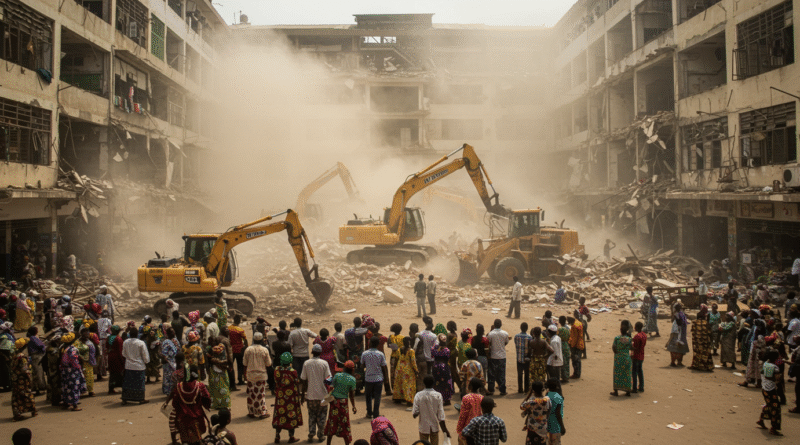Lagos Demolition Sparks Outcry at Trade Fair Complex
When bulldozers rolled into the New Mandela Plaza at the Trade Fair Complex, traders watched their world crash in minutes. The Lagos State Government said it was enforcing planning laws. To those on the ground, it felt like justice without warning.
Why Lagos Moved In
Officials from the Lagos State Building Control Agency (LASBCA), LASURA, and security forces said the Lagos Trade Fair demolition targeted illegal and defective buildings. According to them, 19 structures blocked road setbacks, violated drainage systems, or lacked proper approvals. The government insists these actions are necessary to prevent flooding, restore order, and enforce the city’s master plan.
Traders Cry Foul
But traders tell another story. Many say no notice was served before the demolition. Others argue they held federal approvals and could not understand why Lagos tore down their buildings. Goods were lost, livelihoods destroyed, and some families faced ruin overnight.
One trader’s voice captured the mood: “We built our future here. They came with bulldozers, and in hours, everything was gone.”
Beyond Broken Blocks: The Real Estate Effect
The Lagos Trade Fair demolition is more than a clash between state law and property owners. It highlights a deeper problem: fragile land governance in Nigeria.
Investors now ask: if approvals can be questioned after buildings are raised, what does that mean for the security of title? For buyers, renters, and real estate firms, the risk of investing without airtight documentation just became painfully clear.
This uncertainty can freeze real estate growth. Developers may hesitate to put money into Lagos projects, fearing sudden losses. Renters and middle-class families could face higher prices as supply shrinks. Even diaspora Nigerians, often a strong source of real estate investment, may think twice about sending money home to build.
Climate and City Planning Questions
Lagos sits at the edge of climate pressure. Rising seas and heavier rains demand better drainage and strict planning. The state argues that demolitions like this help reduce flooding and protect the environment.
Yet, if enforcement feels arbitrary, citizens may resist future climate-resilient planning. Trust is as important as bulldozers. Without it, every demolition deepens suspicion, not safety.
Worse, uncoordinated demolitions can create new environmental problems. Debris left behind clogs waterways, dust pollutes the air, and displaced traders move into unregulated spaces that worsen urban sprawl.
Why It Matters to You
For the ordinary Nigerian, the Lagos Trade Fair demolition is a warning about the fragility of daily life. A shop, a warehouse, and or a building is not just concrete walls. They are school fees, hospital bills, retirement savings, and meals on the table.
When such structures fall, poverty grows sharper. Families lose income, workers lose jobs, and small businesses collapse. The ripple extends beyond Ojo LGA: fewer goods flow through the market, prices rise, and the city’s economy feels the shock.
It also matters for justice. If property rights are uncertain, the dream of owning a secure home or shop remains out of reach for millions. Nigerians need to trust that following due process will protect them. Without that trust, the real estate market becomes a gamble, not an investment.
Effects on the Economy
The Lagos Trade Fair demolition does not stop at broken shops and displaced traders. Its impact stretches into the larger Nigerian economy.
Trade Fair Complex is one of West Africa’s busiest commercial hubs. Goods flow from Lagos to other states and even across borders. By demolishing 19 buildings, supply chains are disrupted. Importers, wholesalers, and transporters all feel the pinch.
In the short term, Lagos risks inflation in certain consumer goods, as destroyed warehouses reduce availability. In the medium term, investor confidence takes a hit. Both local and foreign investors may hold back funds, uncertain if their projects will survive shifting policies.
In the long run, repeated demolitions without transparent procedures could erode Nigeria’s competitiveness. If Lagos, Africa’s commercial capital, is seen as unstable for property investment, capital may flow elsewhere. That means fewer jobs, slower GDP growth, and a wider gap between Nigeria and competing economies like Ghana or Kenya.
Related News
Nigeria Real Estate Data Crisis
Lagos Property Demolition Crisis
Enugu Real Estate Takes Off with Aviation Boom
Conclusion
The Lagos Trade Fair demolition may land in court. Property owners are already considering legal battles, and the federal-state authority clash could stretch longer.
For Lagosians, the lesson is sharp: in land and housing, paper speaks louder than concrete. Secure your approvals, understand the layers of law, and never assume a standing building is a safe building.

